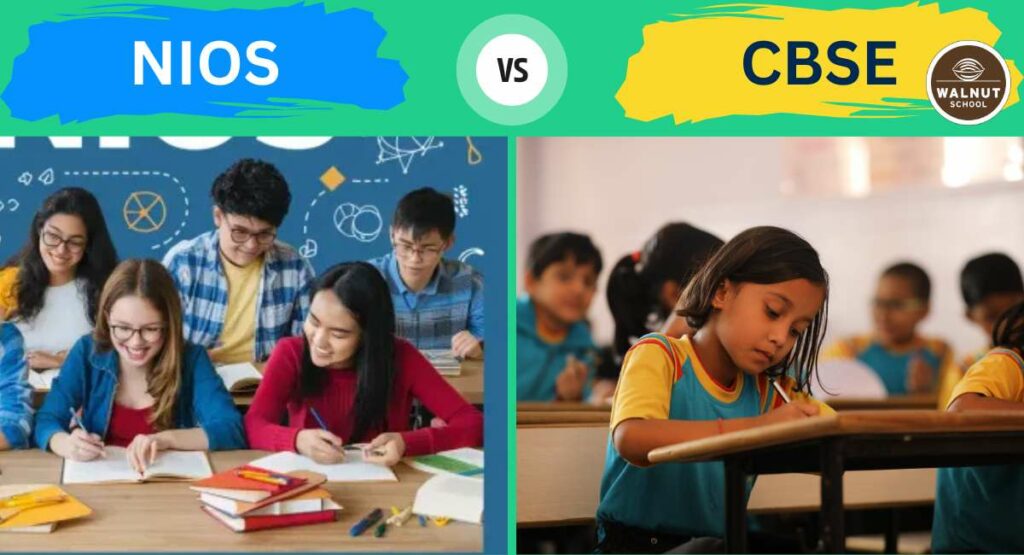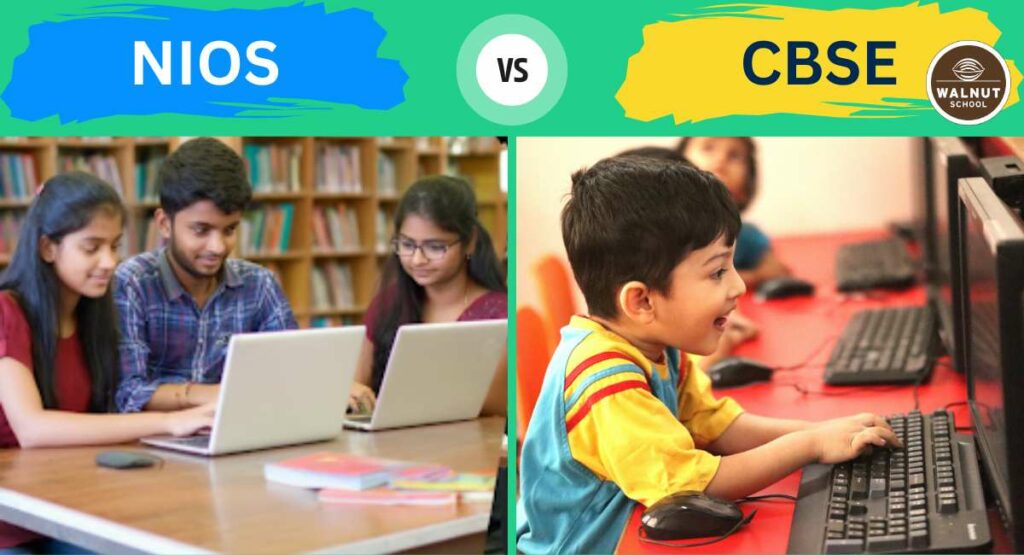
Education plays a crucial role in shaping a student’s future. Parents often face a tough decision when choosing between the National Institute of Open Schooling (NIOS) and the Central Board of Secondary Education (CBSE) for their children. Both boards have unique features, strengths, and challenges, which We will explore the differences from the perspective of Walnut School, one of the best CBSE schools in Pune, to help you make an informed decision.
Understanding NIOS and CBSE
What is NIOS?
The Government of India established the National Institute of Open Schooling (NIOS) as a flexible education system. NIOS delivers open and distance learning, enabling students who cannot attend regular schools to continue their education. This inclusive approach creates opportunities for differently-abled students, working professionals, and anyone who prefers to complete their education at their own pace.
What is CBSE?
The Central Board of Secondary Education (CBSE) is one of the most prestigious education boards in India. Known for its structured curriculum and standardized examination system, CBSE focuses on holistic education. At Walnut School, we follow CBSE to deliver high academic standards while fostering creativity and strategic thinking. Walnut School stands among the top CBSE schools in Pune, combining innovative teaching methods and skill development with strong academics to prepare students thoroughly for competitive exams like JEE and NEET.
Pros and Cons of NIOS and CBSE

The National Institute of Open Schooling (NIOS) offers a flexible learning schedule, allowing students to study at their own pace, which benefits those with extracurricular activities, sports, or other commitments. It provides a wide range of subject choices, catering to diverse interests and career goals. NIOS is ideal for non-traditional students, such as those who can’t attend regular schools due to personal or professional reasons. However, NIOS has limitations, including limited peer interaction, which can affect social development. The less structured environment challenges some students to maintain discipline, and many consider it less rigorous than the Central Board of Secondary Education (CBSE).
The CBSE curriculum offers a standardized and well-structured approach to education. It emphasizes academic rigor and preparation for competitive exams, making it ideal for students aiming for higher education in fields such as engineering or medicine. Walnut School, as a leading CBSE institution, enhances this structured approach by incorporating innovative methodologies like STEM activities and entrepreneurship programs. Additionally, Walnut School provides ample extracurricular opportunities, fostering all-round development.
Key Differences Between NIOS and CBSE

1. Curriculum Design
NIOS: The curriculum is flexible, with options to choose subjects based on interest. It is more suitable for self-paced learners.
CBSE: The curriculum is structured and uniform across all CBSE-affiliated schools. At Walnut School, we go beyond the structured framework to integrate computational thinking and entrepreneurship, preparing students to excel academically and holistically.
2. Examination Pattern
NIOS: Exams are conducted twice a year, in April and October, giving students flexibility in scheduling their tests.
CBSE: Exams follow a fixed annual schedule with board examinations in March. Walnut School prepares students thoroughly for examinations through rigorous academic training, stress-management techniques, and personalized support.
3. Learning Approach
NIOS: Focuses on open learning, providing study materials and online resources to students.
CBSE: Encourages classroom learning with teacher-led instructions. At Walnut School, we enhance this approach by incorporating modern teaching tools, Advanced academics, collaborative projects, and real-world applications to make learning engaging and impactful.
4. Recognition and Scope
NIOS: NIOS certificates are recognized for higher education and employment, but some institutions may prefer CBSE for its rigor.
CBSE: Widely recognized and accepted for both national and international education opportunities. At Walnut School, students benefit from the strong reputation of CBSE, which ensures a solid foundation for success in prestigious universities worldwide.
5. Suitability
NIOS: NIOS is perfect for students needing flexibility due to personal, professional, or medical reasons. It allows learners to study at their own pace, choose subjects, and set exam schedules. This flexibility makes it ideal for those with other commitments or health challenges, ensuring they can continue their education despite obstacles.
CBSE: Ideal for students aiming for a structured education system and competitive exams, CBSE provides a solid foundation for academic success. Walnut School, as a CBSE-affiliated institution, supports students in achieving their academic and career goals through structured yet innovative learning practices. We also implement differential teaching, adjusting our methods to cater to the diverse learning needs and abilities of each student, ensuring all students receive the necessary support to excel.
Final Thoughts
Choosing between NIOS and CBSE depends on the specific needs and priorities of each student. NIOS is an excellent option for those who value flexibility and self-paced learning, making it particularly suitable for students with unique schedules, such as aspiring athletes, artists, or those with personal commitments. Its flexible curriculum allows learners to choose subjects based on their interests and progress at a pace that works best for them. This approach is especially helpful for non-traditional students or those who face challenges attending regular schools. However, the less structured environment may require a higher level of self-discipline and independence from students.
On the other hand, CBSE offers a structured education system that focuses on academic rigor, consistency, and preparation for competitive exams like JEE and NEET. At Walnut School, we take this structured approach further by integrating creativity and innovation into our teaching methods. Our curriculum helps students excel academically while developing critical thinking, problem-solving, and essential life skills. We use modern teaching techniques, extracurricular activities, and holistic development approaches to prepare students for achieving their goals and thriving in their chosen paths. By evaluating your child’s goals, strengths, and circumstances, you can make an informed decision about which board aligns best with their aspirations.
Frequently Asked Questions (FAQs)
Q1: Which board is better for competitive exams?
CBSE is better for competitive exams like JEE and NEET due to its science-focused curriculum and standardized preparation methods. At Walnut School, we integrate coaching techniques and provide resources to prepare students for these exams.
Q2: Is NIOS valid for higher education?
Yes, NIOS is valid for higher education in India and abroad. Universities accept NIOS certificates for admissions, though CBSE is sometimes preferred.
Q3: Can NIOS students switch to CBSE?
Yes, NIOS students can switch to CBSE. However, they need to meet the eligibility criteria of the respective CBSE-affiliated school. Walnut School evaluates such cases individually to ensure a seamless transition for students.
Q4: Why do CBSE schools rank higher in India?
CBSE schools often rank higher due to their consistent academic performance, extracurricular focus, and competitive exam preparation. Schools like Walnut School exemplify this through a balanced approach that combines academic excellence with extra curricular activities.
5: Are there any significant differences in the exam patterns between NIOS and CBSE
NIOS (National Institute of Open Schooling) offers flexible exam patterns, allowing students to choose subjects and take exams multiple times a year, catering to non-traditional learners. In contrast, CBSE (Central Board of Secondary Education) follows a fixed curriculum with regular attendance and standardized exams. NIOS requires a minimum of five subjects, while CBSE students must cover a broader range of compulsory subjects.
6: Are there any specific advantages for students with special needs in NIOS
NIOS (National Institute of Open Schooling) provides several advantages for students with special needs, including inclusive education and flexibility in learning at their own pace. It offers specialized support with tailored programs and trained educators to address individual challenges.Overall, NIOS fosters a supportive environment that promotes independence and personal growth for these students.
Connect with us
Ready to experience innovative education firsthand? Reach out to us through any of these convenient channels:
📱 Quick Connect: Message us on WhatsApp 📞 Call Us: 020 3500 7900
Visit our Campuses
Experience our state-of-the-art facilities at:
Start your child’s journey towards excellence today. Schedule a campus visit or connect with our admissions team for more information.